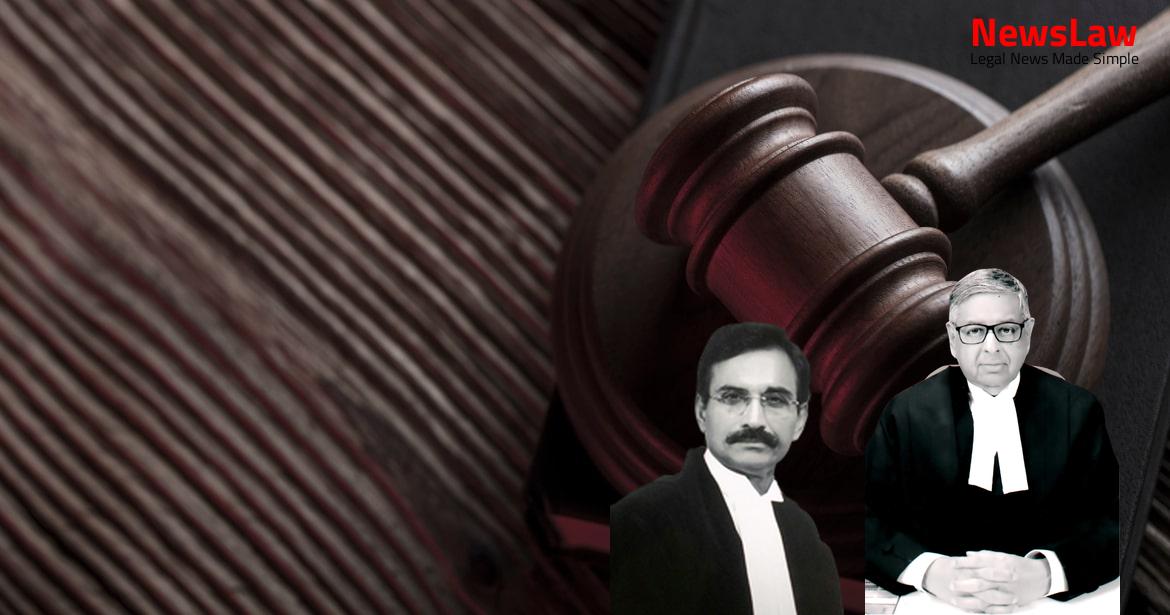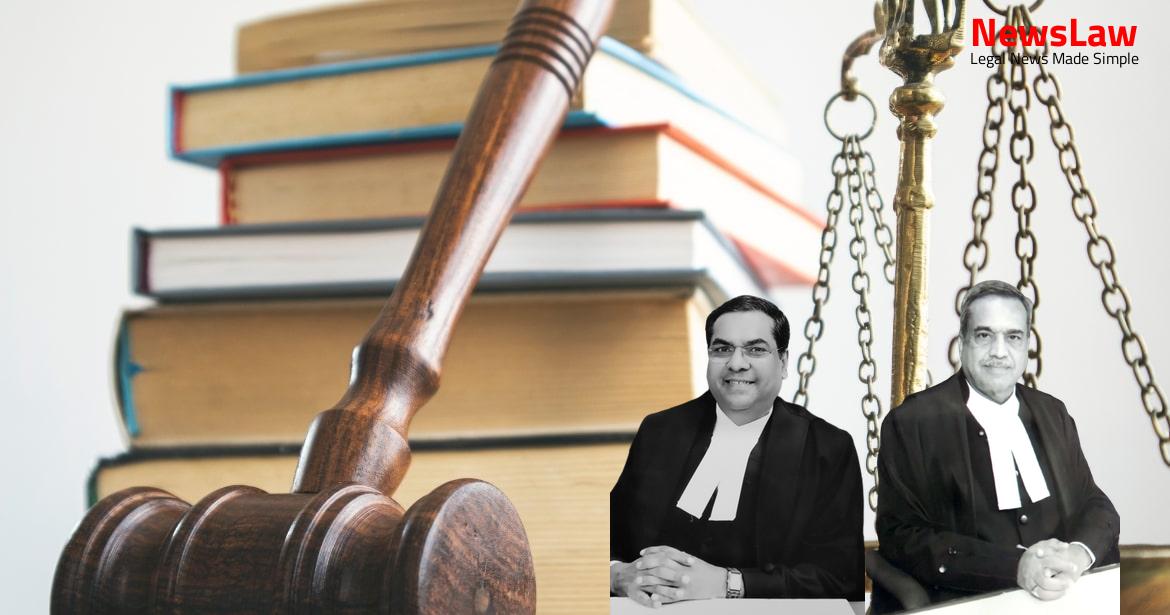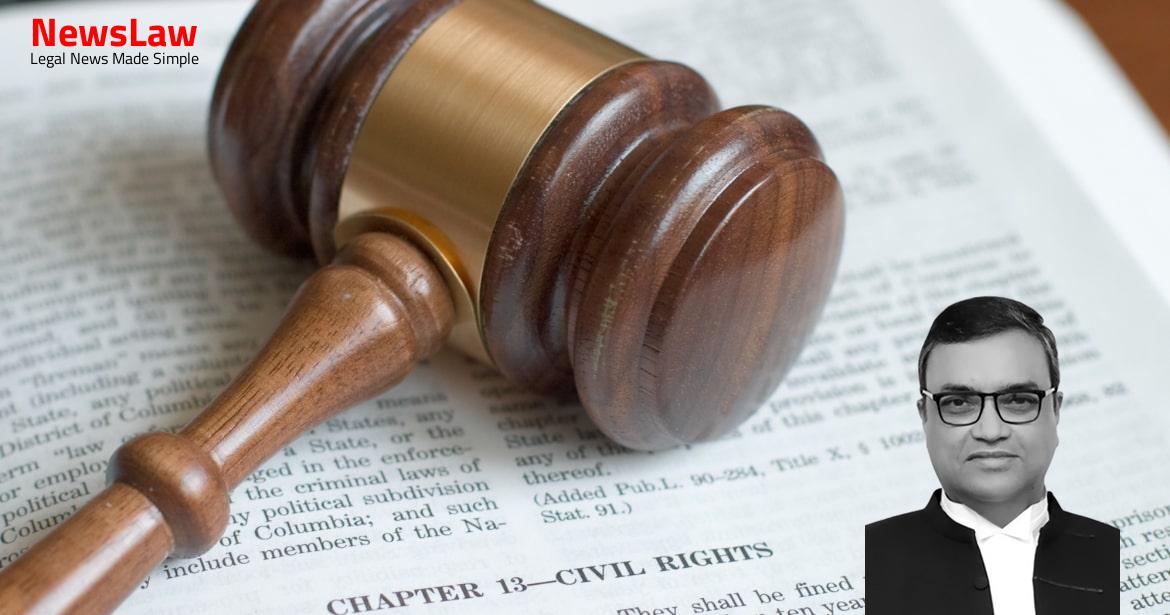The case delves into the complex legal implications surrounding the liability for interest on short deduction of tax at source. With a focus on the court’s in-depth legal analysis, this summary sheds light on the nuances of tax law and compliance. Stay informed about the latest developments in tax law to ensure fairness and accuracy in financial matters.
Facts
- Assessment order passed on 24.03.2006 for the assessment years 1998-99 to 2004-05.
- CIT dismissed appeals by the Respondent-Assessee.
- Dispute regarding liability to pay interest on short payment of advance tax.
- Decision influenced by ITAT order in case of Respondent for 2005-06.
- Challenges and appeals filed by both parties.
- ITAT allowed appeals of the Respondent-Assessee on 23.06.2009.
- Assessing Officer determined income attributable to Indian operations.
- Respondent found liable to pay advance tax under Section 191 if no deduction by payer where tax is deductible at source.
- The ITAT concluded that the Respondent was not liable for payment of interest under Section 234B as tax was liable to be deducted at source from payments made to the Respondent.
- The High Court referred to judgements of Uttarakhand High Court, Bombay High Court, and others to support the conclusion that an individual assessee cannot be held liable to pay interest for a company’s default in deducting tax at source.
- In the NGC Network Asia LLC case, the Bombay High Court ruled that if the payer fails to deduct tax at source, no interest can be imposed on the payee-assessee under Section 234B.
- The ITAT relied on its earlier decision, the special bench decision in the case of Motorola Incorporation, and decisions of Uttarakhand High Court and Bombay High Court in upholding the Respondent’s position.
Also Read: Legal Analysis on Seniority Fixation in Contempt Petitions
Issue
- The High Court framed the question of law on whether the levy of interest under Section 234B of the Act for short deduction of tax at source is mandatory and automatically leviable.
Also Read: Analysis of Authorization and Limitation in Filing Section 7 Application
Arguments
- The phrase ‘deductible or collectible at source’ does not include tax not deducted within statutory time
- Section 234B is compensatory to compensate the Government for unpaid tax
- Choice of the Revenue for recovery mode cannot be restricted between assessee and payer
- Section 234B is a standalone provision and should not import words from Section 209(1)(d)
- Excess amounts collected by Revenue would be refunded once tax is recovered successfully
- Explanation 1 to Section 234B(1) defines ‘assessed tax’ to include tax deducted at source
- Failure in paying advance tax is the liability of the assessee as per relevant provisions
- Interest under Section 234B cannot be imposed on assessee for payers’ failure to deduct tax
- The provisions pertaining to the payment of advance tax and levy of interest for default in payment of advance tax do not apply if tax has to be deducted at source.
- Deduction of tax at source and payment of tax are considered as two different components of tax recovery under the Act.
- Levy of interest under Section 234B requires specific pre-conditions to be met.
- Section 234B of the Act should be interpreted in conjunction with Section 209 of the Act.
- The Act allows the payer to be declared as an assessee in default for failure to deduct tax at source, leading to proceedings for recovery and penal provisions as provided in the Act.
- While the Act imposes an obligation on the Assessee to pay advance tax, the liability to pay advance tax and subsequent default must be established to attract the levy of interest under Section 234B.
- The assessee should not be penalized for defaults on the part of the payer.
Also Read: Judicial Review of Selection Process for DGP Appointment
Analysis
- The 1991 amendment to Section 80-HHC demonstrates the wide and unrestricted interpretation of the words ‘minerals and ores’.
- Subsequent legislation can be used to interpret earlier Acts if they are ambiguous.
- The introduction of the phrase ‘other than’ in sub-section 2(b) of Section 80-HHC in 1991 indicates a specific class being carved out from the generic class of ‘minerals and ores’.
- Processed minerals and ores subjected to cutting and polishing are entitled to the benefit of Section 80-HHC, while other species remain excluded.
- Subsequent legislation can be looked into for proper interpretation of statutory provisions as they stood earlier.
- Prior to the financial year 2012-13, income tax deductible or collectible at source could be reduced by the assessee for calculating advance tax.
- The Revenue has remedies under the Act to proceed against payers who default in deducting tax at source.
- In the financial year 2012-13, the proviso to Section 209 (1) (d) prohibits reducing tax while computing advance tax liability.
- The ITAT held that the assessees were not liable to pay interest under Section 234B of the Act, relying on the judgement of the Delhi High Court in Director of Income-tax v. Mitsubishi Corporation.
- The pre-conditions for levy of interest under Section 234B were not satisfied in the present case, as Section 209(1)(d) had been complied with to compute that the Respondent-Assessee had no advance tax liability.
- In cases where the assessee receives or pays any amount without deduction or collection of tax, they are not liable to pay advance tax to the extent the tax is deductible or collectible from such amount.
- The proviso to Section 209(1)(d) is an exception, making an assessee liable to pay advance tax in respect of income received without deduction or collection of tax.
- The amendment to Section 209(1)(d) introduced in the Finance Act, 2012, was to clarify the liability for payment of advance tax in such cases.
- The appeals filed by the Revenue were dismissed based on the interpretation of the provisions of the Act relevant to the question of law at hand.
- Section 209(1) of the Act outlines the computation of advance tax payable by an assessee in the financial year.
- The advance tax is calculated based on the current income and income tax rates in force for the financial year.
- The amount of income tax calculated is reduced by the tax deductible or collectible at source during the financial year.
- In case of failure to pay advance tax or if paid amount is less than 90% of the assessed tax, interest is applicable as per Section 234B.
- The liability for advance tax can be computed through self-estimation by the assessee or by the Assessing Officer based on previous income tax assessments.
- The proviso inserted by the Finance Act, 2012 states that the income tax calculated shall not be reduced by the amount deductible at source if the tax has been paid or credited without deduction.
- The High Court found it difficult to believe that the payers would have failed to deduct tax at source unless prompted by the assessees.
Decision
- The High Court held the assessees liable to pay interest under Section 234B of the Act.
- Ruling in favor of the Revenue, the Delhi High Court’s decision on 08.09.2014 supported the interest assessment under Section 234B.
- The Appeals in question were covered by a previous judgement in Civil Appeal No.1262 of 2016.
- The Division Bench of the Delhi High Court, in a judgement on 07.11.2013, allowed the Revenue’s Appeals filed under Section 260A of the Act, stating that assessees could not shift responsibility to Indian payers for tax deductions.
Case Title: DIRECTOR OF I.T NEW DELHI Vs. M/S MITSUBHISHI CORP. (2021 INSC 495)
Case Number: C.A. No.-001262-001262 / 2016



